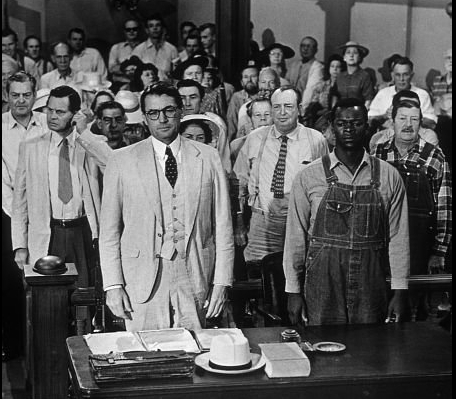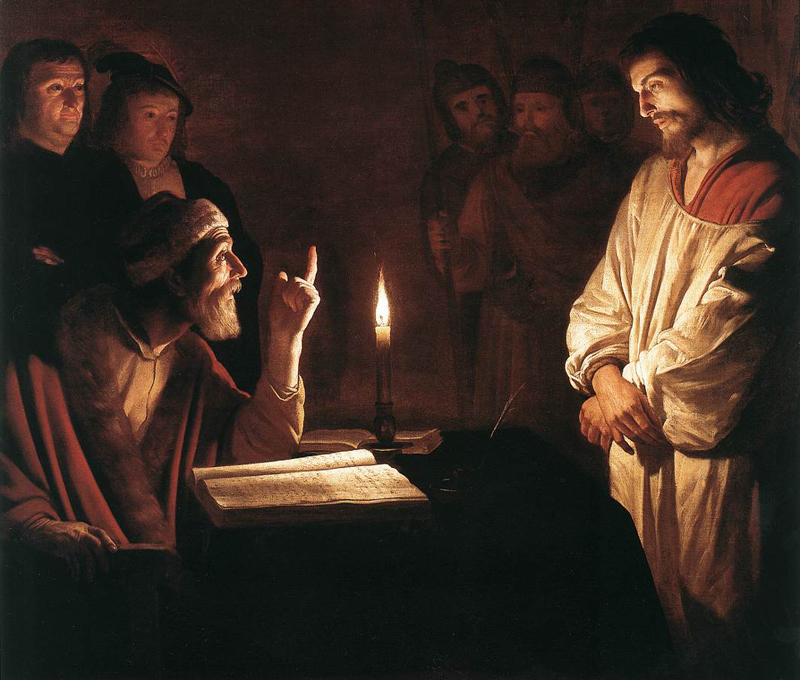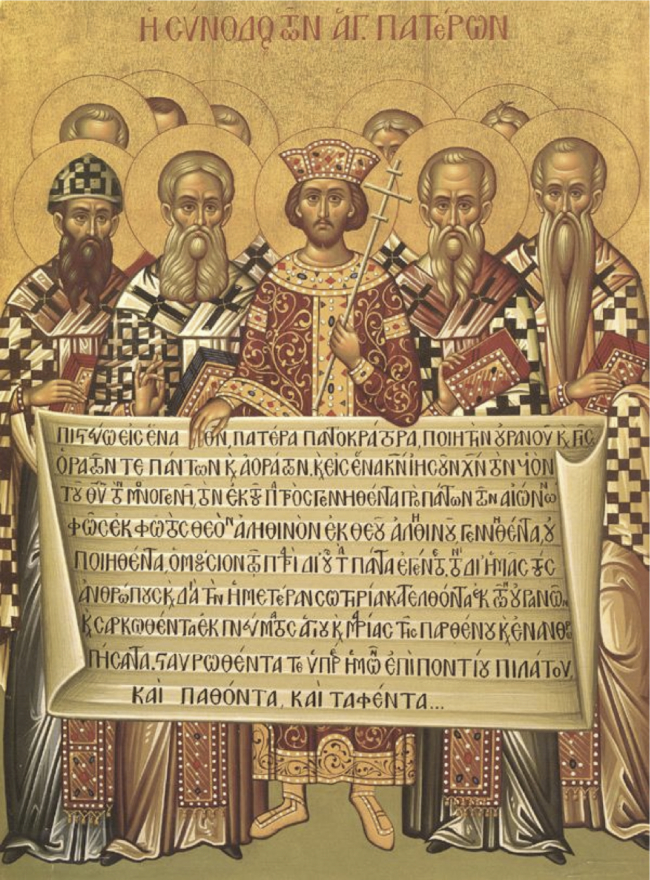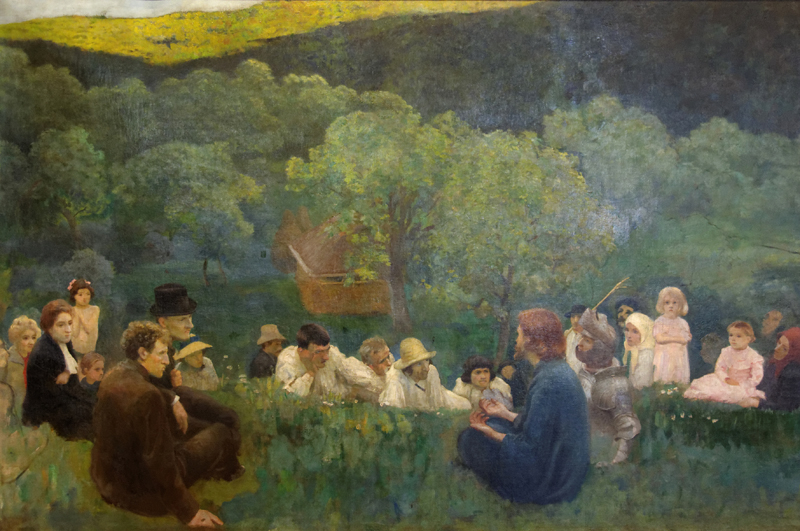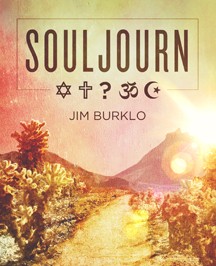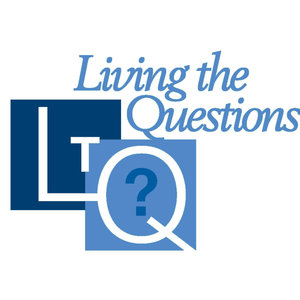Reinhold Niebuhr's brother, H. Richard, argued for faithfulness to the example of Jesus's nonviolence, while Reinhold believed this was naive and unrealistic in an imperfect world. H. Richard was the purist to the Christian faith, believing that following the Golden Rule, no matter the consequences, is what Jesus and God called us to do -- the success of the mission being in God's hands rather than our own. Reinhold, however, looked at the more practical side of things, substituting his or the world's idea of what was possible and changing his ethics accordingly. H. Richard thus trusted more in the providential moral arc of history as M.L. King, Jr. , would call it rather than a realist's version of what humans believe is attainable given their corrupt nature. In essence, H. Richard focused on the power of God's grace to transform our spirits and the world for the better, while Reinhold accepted a more cynical view of our ability to be radically changed as a specie.
In May 2017, people from all over the world will gather in Portland, Oregon to share knowledge and wisdom, learn from each other, celebrate, be inspired, and find the tools needed to create and enliven local movements within our communities. Together we will explore sacred oneness, Christ consciousness, eco-spirituality, social justice and the way of universal and personal transformation that honors the Divine in all.
One of the world’s foremost historical Jesus scholars helps the church and its alumni/ae rise above the greatest of Christian treasons: that everlasting peace can only be achieved through the onslaught of divine violence.
Teen and Young Adult Curriculum
Spiritual Activism is a concept originating from the understanding that youths’ incredible energy can be guided into living a life based on the “will to good” and positive social change. This begins by seeking inner peace and a connection to our consciousness. You can and you will activate your own calling for a life of meaning reflected in daily actions and service for the greater good.
Racism, the Imbalance of Power, and the Response of the Prophetic Voice
The literary world is in an uproar, learning that a prequel to Harper Lee's great American novel, "To Kill a Mockingbird," depicts the beloved Atticus Finch as a southern white racist. Is it possible that, like the fictional character, we can ever evolve and change?
Much of what passes as information about Islam is weed-like disinformation rooted in stereotype and watered by fear. In The Jesus Fatwah, Islamic and Christian scholars offer reliable information about what Muslims believe, how they live out their faith, and how we all can be about building relationships across the lines of faith.
A Spiritual Path for Personal Transformation
An aging Vietnam vet suffering from PTSD returns to Da Nang after 50 years in order to try to do something for those still afflicted generations later by the lingering toxic affects of Agent Orange. His nagging conscience leads to a redemptive act of self-healing and a common good. Spirituality is often an amorphous and bandied about term that too often connotes the merely religious type, as somehow distinct from those who are not. Instead, I appreciate something as equally shared as it is often neglected, namely the human conscience and our sometimes-belated conscious awareness of it.
A Partner Organization of ours, Progressive Christians Uniting, created this excellent curriculum to help people grow in their communities to care for the earth both personally and socially. These resources are for small group formation. Thank you friends at PCU for sharing! Check out our new "Go Green" action item under Resources on the home page for more tips and info on climate change.
Satire and Blasphemy in the Teachings of a Galilean Sage
Radical religious extremists with a distorted view of Islam commit horrific acts of terror, executing the staff of a small satirical French publication. The satirists had dared to depict the Prophet Mohammed in cartoon caricature; all the while lampooning those misbegotten adherents who in turn regard such irreverent acts as blasphemous. The Western world reacts with outrage and defiance to such an affront. World leaders join a million person protest and unity march through the streets of Paris, chanting “Je Suis Charlie,” in defense of freedom of speech, and on behalf of the publication’s name. While a clear distinction might be drawn between the use of words and the vehement reactions they may incite, more profound underlying questions remain. While anti-blasphemy laws are common in Muslim countries, countless other "secular" countries have laws against the defamation of religion, as well. Once the dust settles and more thoughtful discussion ensues, one might ask what constitutes the differences between hate speech and freedom of expression? This commentary consider s esus' use of what was deemed blasphemous satire, it's intended purpose, and well-known consequences.
Originally brain-stormed by and created for the Generation NOW Meeting in 2009. This video can be used as a tool for deep inquiry and discussion.
An Open-Ended “Creed” for a Progressive Christian
I have often said so-called “progressive Christianity” is a notion forever in search of its own elusive definition; and that’s as good a way of explaining it as we may be able to find. We live in a post-modern world that considers the age of Enlightenment to be a post-facto reality. As such, “progressive” thinking in an age of Reason has pushed the boundaries of nearly every facet of life, except one: those ‘traditional’ or ‘orthodox’ beliefs, based on certain creeds, doctrines and dogma that still dominate what it presumably means to be “Christian.” It hardly needs to be said that it is also why so many one-time believers have outgrown their one-time faith. Calling them merely “lapsed” is misleading. So much has elapsed in the world we have all come to know and take for granted, that the once-dominant Church -- -- despite all its denominational varieties -- has fast become a post-modern relic. Yet any critical examination of how Christian scriptures developed and how the history of the tradition evolved will quickly demonstrate how it has always been in a constant state of flux. Or, if you like, “progression.” It was only when it stopped and got stuck that we traded in the tent for a temple, and snuffed the life out of a movement that is progressive by its very nature. What then would constitute an honest statement of belief for at least this "progressive Christian?"
Wisdom from 13 Traditions on 9 Universal Themes: Justice, Gratitude, Peace, Service, Compassion, Forgiveness, Healing, Nature, Prayer
Series on the Teachings of a Galilean Sage: The Sermon on the Mount, PART II
The social world order seems to erupt in chaos and violence on a regular basis these days. Regimes hold on to political power at all costs, while those who are more often than not economically oppressed demonstrate and confront government forces with little more than their willingness to stand in opposition. If this all sounds like pure political commentary, consider this: The socio-political landscape in first century Palestine, CE, wasn’t much different. The practical means by which the imbalance of power was wielded by some over others may have been rather primitive by today’s technological standards; but the end game was the same. The itinerant Jewish peasant teacher and sage who would long be remembered as uttering such impractical non-sense as “turn the other cheek” and “love your enemy,” was the same historical figure that was executed as an insurrectionist, not a “resurrectionist.” As I’ve put it bluntly elsewhere, Jesus didn’t die for our sins, but because of them. But the historical Jesus’s message deviated so radically from the “you have heard it said, but I say to you” literary device employed that it constituted a world view that did not simply turn everything upside down; but attempted to right what becomes a distorted “default” assumption of human nature that too easily concedes it is only human instinct to regard ourselves as prejudicial and self-centered creeps. Jesus’ teachings to “turn the other cheek” and “love one’s enemies” is an invitation to an inward journey of the self; and a call to reclaim our true huma n nature.
In The Challenge of Jesus, renowned historical Jesus scholar John Dominic Crossan, presents his life’s work exploring the matrix of Jesus’ unique time and place. Drawing on scholarly text, excavation and history, Dr. Crossan introduces us to the flesh and blood people who shaped the world into which Jesus was born. In these DVD presentations, we meet a Jesus we’ve not known before.
Part One in this series considered the notion of “God,” or “gods,” as the single most elusive idea the human imagination has ever concocted or tried to fathom. But we typically constrain ourselves, thinking only in theistic terms; and fashion our notion of “God” in an anthropomorphic image so we can more easily relate to the idea. We ascribe to such a being all kinds of desirable characteristics that might comprise this composite character. The Christian then proceeds to incarnate that idea with a Christology in which Jesus is typically construed as mediator and chief negotiator; to the extent such a savior is willing to atone for all our wretchedness and secure our own immortality in another existence. It’s all pretty fanciful stuff. But for those progressives for whom such a construct is no longer viable or credible, it is not simply a question of what remains amidst the theological rubble, but what more, or other, might yet be discovered? As such, we ask how we might speak of such things. What language might we use?
The Thai telecommunications conglomerate True is getting rave reviews worldwide for its latest spot, "Giving," which tells the story of a man unexpectedly rewarded for a lifetime of good deeds he performed without expecting anything in return.
Let's stop being so negative about the group that is transforming religion and spirituality in the 21st century. One-fifth of the American public – and a third of adults under 30 – do not identify themselves with a religion. This is a growth from 15% to 20% of the population in just five years, and we have no doubt that similar trends are happening around the world.
These are Study and Discussion Questions that can be used with SOULJOURN, By Jim Burklo Find the book here Have you ever had
From SoulSeeds.Com
Your vision doesn’t have to be pretty, and it doesn’t have to conform to other peoples’ expectations. It just has to be clear. What if your vision is lost in a blizzard like mind fog? It’s sometimes hard to see past the demands of the moment to imagine life in the future.
I believe there is great value in gaining some understanding of the leading developmental stage theories, and particularly how they relate to one another. This can be valuable for use for oneself as well as it is, often highly so, for working with other people who may have less insight into themselves and less knowledge of either social science findings or spiritual development than you or other "people helpers" do.
Sadly, some people do stop thinking in terms of their growth except as it relates to occupational skills or promotions perhaps. But I think most people are quite aware of their need for ongoing growth throughout life. Are there, then, some meaningful markers to see how we are doing? Can such markers be used by scholars or “people helpers” who want to size up anyone from individuals to entire societies in terms of development?
This curriculum edition DVD program may be used for online study via a computer DVD drive and screen sharing.





